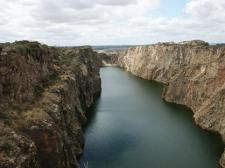
Ormonde’s Tungsten Mine Looks Set To Revitalise Spanish Community
For the uninitiated, there was a line in the most recent release from Ormonde Mining that might have sounded alarm bells.
The company spoke of a “compulsory acquisition process” that is now underway relating to land in the vicinity of its Barruecopardo tungsten project in Spain.
But this is not a case of moving people off land, or even of acquiring land in a situation where there is no willing seller.
Rather, as Ormonde’s new managing director Steve Nicol explains, while the situation may be laced with legal nuance it is not at all fractious.
“We have 85% of the land we need signed up”, he says. “All who can show ownership have signed.”
To put it another way, there’s no opposition to the project and its attendant processes whatsoever.
Anyone who can show land ownership has signed up to Ormonde’s plans. The issue is with land where the ownership is either unclear, or where the documentation is no longer available.
In that instance, Ormonde has been given license by the relevant authorities to assume ownership, although clearly there are certain formal procedures that have to be followed.
And in fact, initiating those procedures has had the effect of encouraging some landowners to come out of the woodwork.
“At any time these people can do what’s necessary to get their paperwork in order”, says Steve. “And some people have done just that and we’ve been able to negotiate.”
It’s helpful that Ormonde has a long track record of friendly relations with the local community.
Steve himself has lived in Spain for the last six years and speaks fluent Spanish. He’s at the heart of a network of relationships that have ensured that Ormonde’s corporate existence in Spain has been almost entirely glitch free.
The company’s local subsidiary, Saloro, has an office in the centre of the town of Barruecopardo, and it regularly opens up to receive deputations from the locals and recognise any concerns they may have.
“We have a communications committee in the town”, says Steve, “and we have excellent relations with the mayor.”
On occasion, he adds, he’ll even sleep in the town when he’s there on business.
It’s a town that’s nice enough, he says, but one that’s nevertheless badly in need of revitalisation.
“The town remembers when the mine was there before. It closed in 1982, and the closure has resulted in a significant decline in the population.”
And it’s in this context that the local landowners are not putting up any sort of resistance to Ormonde’s plans in a manner similar, say, to the way opposition mounted to Spanish copper miner EMED Mining as it attempted to consolidate its own position around the famous old Rio Tinto mine.
That situation eventually only became unjammed when a new management team was parachuted in right at the top of EMED.
In the case of Ormonde, the case is very different. The compulsory purchase process is now nearing completion and the locals are eager for mine construction to begin.
“The population has now declined to the point where the schools are at risk”, says Steve. “For the local population the mine is an opportunity that people see for their children to come home.”
Perhaps the most telling fact of all in this context is the average age of the residents of Barruecopardo. At 66, this is a town that’s becoming sleepier by the minute.
So with that in mind, it’s no surprise that when Ormonde seeks permits and other help from local authorities it’s generally forthcoming.
In the most recent developments ahead of construction the company has just received its council building permit. Its environmental bond is in place and its water use license is pending.
Perhaps more important than any of that, it’s got the money in the bank actually to build the mine.
So locals can rest easy that it won’t be too long now before the whole area gets a significant shot in the arm when it comes to employment. And the knock-on effects of that should be immense.
No wonder the land transactions are proceeding smoothly.





